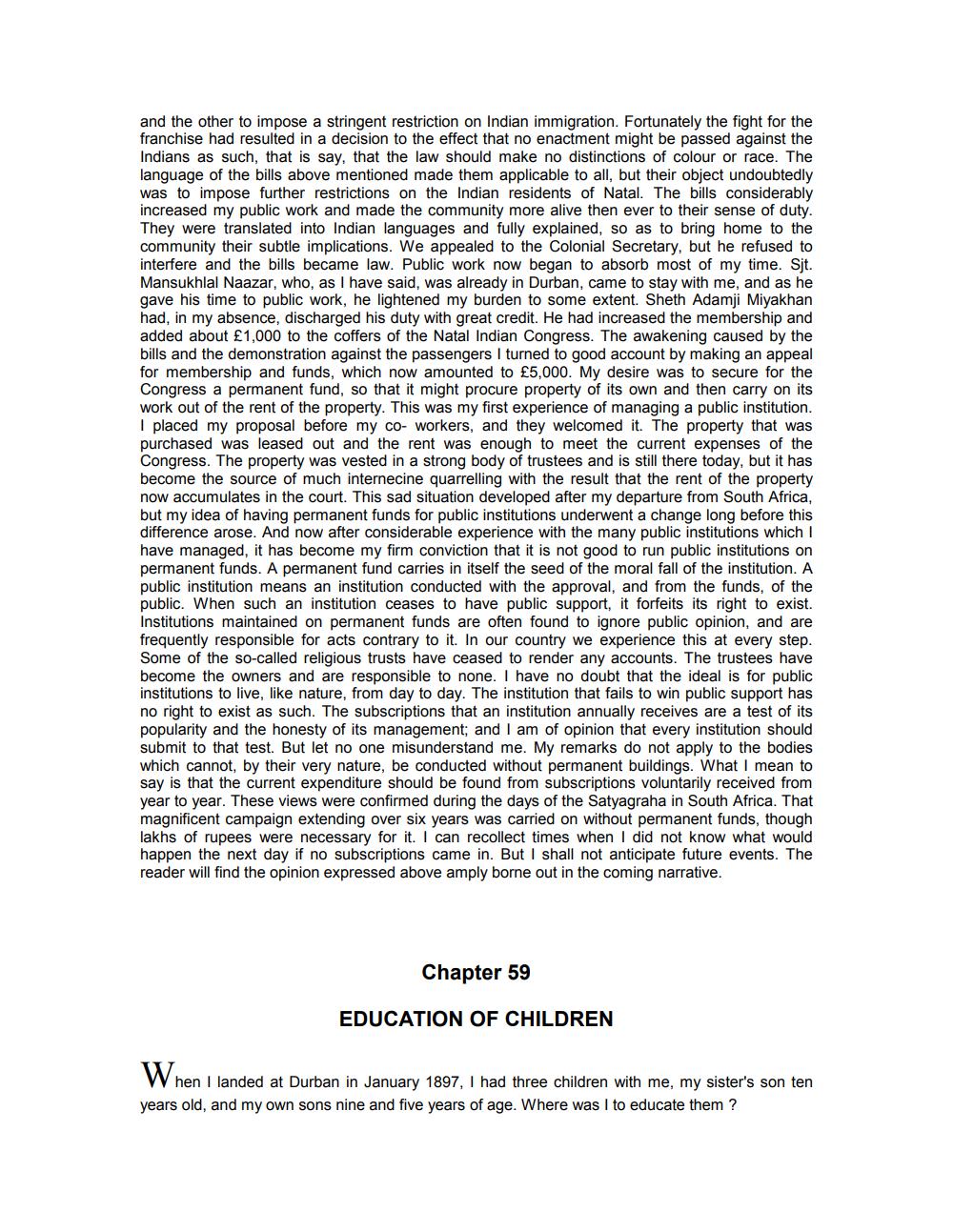________________
and the other to impose a stringent restriction on Indian immigration. Fortunately the fight for the franchise had resulted in a decision to the effect that no enactment might be passed against the Indians as such, that is say, that the law should make no distinctions of colour or race. The language of the bills above mentioned made them applicable to all, but their object undoubtedly was to impose further restrictions on the Indian residents of Natal. The bills considerably increased my public work and made the community more alive then ever to their sense of duty. They were translated into Indian languages and fully explained, so as to bring home to the community their subtle implications. We appealed to the Colonial Secretary, but he refused to interfere and the bills became law. Public work now began to absorb most of my time. Sjt. Mansukhlal Naazar, who, as I have said, was already in Durban, came to stay with me, and as he gave his time to public work, he lightened my burden to some extent. Sheth Adamji Miyakhan had, in my absence, discharged his duty with great credit. He had increased the membership and added about £1,000 to the coffers of the Natal Indian Congress. The awakening caused by the bills and the demonstration against the passengers I turned to good account by making an appeal for membership and funds, which now amounted to £5,000. My desire was to secure for the Congress a permanent fund, so that it might procure property of its own and then carry on its work out of the rent of the property. This was my first experience of managing a public institution. I placed my proposal before my co-workers, and they welcomed it. The property that was purchased was leased out and the rent was enough to meet the current expenses of the Congress. The property was vested in a strong body of trustees and is still there today, but it has become the source of much internecine quarrelling with the result that the rent of the property now accumulates in the court. This sad situation developed after my departure from South Africa, but my idea of having permanent funds for public institutions underwent a change long before this difference arose. And now after considerable experience with the many public institutions which have managed, it has become my firm conviction that it is not good to run public institutions on permanent funds. A permanent fund carries in itself the seed of the moral fall of the institution. A public institution means an institution conducted with the approval, and from the funds, of the public. When such an institution ceases to have public support, it forfeits its right to exist. Institutions maintained on permanent funds are often found to ignore public opinion, and are frequently responsible for acts contrary to it. In our country we experience this at every step. Some of the so-called religious trusts have ceased to render any accounts. The trustees have become the owners and are responsible to none. I have no doubt that the ideal is for public institutions to live, like nature, from day to day. The institution that fails to win public support has no right to exist as such. The subscriptions that an institution annually receives are a test of its popularity and the honesty of its management; and I am of opinion that every institution should submit to that test. But let no one misunderstand me. My remarks do not apply to the bodies which cannot, by their very nature, be conducted without permanent buildings. What I mean to say is that the current expenditure should be found from subscriptions voluntarily received from year to year. These views were confirmed during the days of the Satyagraha in South Africa. That magnificent campaign extending over six years was carried on without permanent funds, though lakhs of rupees were necessary for it. I can recollect times when I did not know what would happen the next day if no subscriptions came in. But I shall not anticipate future events. The reader will find the opinion expressed above amply borne out in the coming narrative.
Chapter 59
EDUCATION OF CHILDREN
W hen I landed at Durban in January 1897, I had three children with me, my sister's son ten years old, and my own sons nine and five years of age. Where was to educate them ?




